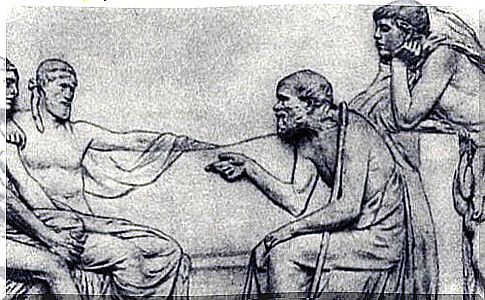The Three Filters Of Socrates

The three filters of Socrates refer to an anecdote of the great Greek philosopher. This story is considered a great lesson in life. It is particularly applicable to situations in which rumors and gossip seek to prevail.
The story of Socrates’ three filters goes that one fine day one of his disciples arrived extremely agitated. He told the philosopher that he had run into one of his friends and that the latter had told him about Socrates in very malicious terms.
Hearing this, Socrates asked him to calm down. After thinking for a moment, he asked her to wait a minute. Before he could hear what he had to say to her, the message had to pass through three necessary filters. If he did not pass these filters, it meant that the message was not worth listening to.
The three filters of Socrates
As usual, the Greek sage asked his very anxious disciple a question. This question was: “Are you absolutely sure that what you are going to tell me is true?”. The disciple thinks for a moment. In reality, he couldn’t be sure what he had heard could be labeled as malicious. It was a matter of point of view. “So you don’t know if everything is true or not,” said the philosopher. The disciple had to admit that it was not.

Then the great Greek master asked him a second question: “What are you going to tell me, is it something good?”. The disciple replied that, of course, there was nothing good about what he was about to say. Quite the contrary. These words, he said, would cause him discomfort and grief. Socrates then signaled: “You are going to tell me something bad, but you are not totally sure that it is true”. The disciple admitted that it was.
Finally, Socrates had to ask him a third question, and he did. He said to him: “Will what you tell me about my friend help me?”. His disciple hesitated. In fact, he didn’t know whether this information would be useful to him or not. It would probably keep him away from his friend. Now, if one did not know whether it was the truth or not, the knowledge might be useless.
Truth, goodness and usefulness
The anecdote of the three filters of Socrates tells that after this, the philosopher refused to listen to what his disciple wanted to say to him. “If what you want to tell me is neither true, nor good, nor useful, why would I want to know it?”.
Truth, goodness and usefulness are the three filters of Socrates. According to the philosopher, these are the three questions that everyone must ask themselves before saying anything. The first is: am I sure what I’m about to say is true? The second is: is what I’m going to say okay? And the third is: is it necessary to say it?

These three filters are an excellent guide, both for what we are going to say and what we are going to listen to. They represent a set of parameters that define what healthy and constructive communication is. This is why this story is still in force despite the passage of centuries.
How to apply the three filters of Socrates
In everyday life it is not easy to define what is true, good and necessary. These are abstract concepts that are sometimes difficult to apply. This is also why there are some additional questions that help to use Socrates’ three filters.
These questions are:
- Facing the Truth: Am I Sure? Can I prove it? Would I be able to defend this idea in front of anyone? Would I be willing to put my reputation on the line for this?
- Facing kindness: Does it help the other person feel better? Will positive emotions emerge from it? Will the situation of those involved improve as a result?
- Faced with utility: will this person’s life or my life improve? Will this person be able to take practical action with this information or message? Will not knowing it affect or harm him in any way?
As we pointed out at the beginning, the three filters of Socrates apply particularly to rumors or gossip. By applying them, this gossip can be stopped in time. However, all this is also valid for another type of messages: those we receive through media and social networks. Much of the information they peddle is of a questionable and unhealthy nature.










